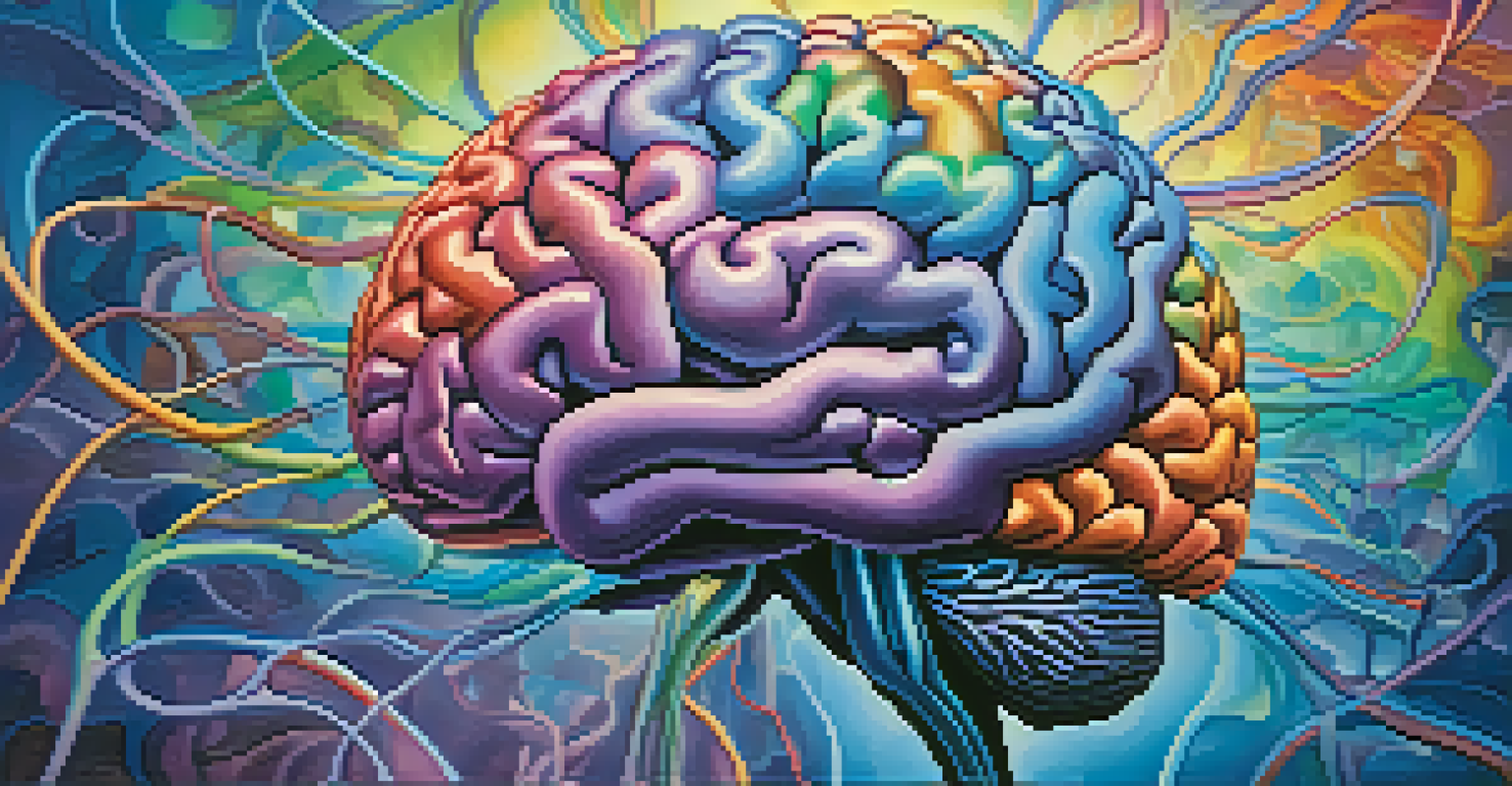Psychedelics and Mental Health: A Promising Future Ahead

Understanding Psychedelics and Their Historical Context
Psychedelics, like psilocybin and LSD, have been used for centuries in various cultures for spiritual and healing purposes. In recent years, these substances have resurfaced in scientific research, challenging long-held perceptions. Historically, the stigma surrounding psychedelics often overshadowed their potential benefits, particularly in mental health treatment.
The use of psychedelics in the treatment of mental health disorders represents a paradigm shift in our understanding of the human mind and its potential for healing.
As we dive into the modern era, there's a growing recognition of psychedelics as tools for healing rather than mere recreational substances. Researchers are now exploring their effects on conditions like PTSD, depression, and anxiety. This shift in perspective is paving the way for a more nuanced understanding of how these compounds can be integrated into mental health care.
By examining the historical context, we can appreciate the journey of psychedelics from ancient ceremonies to contemporary clinical trials, highlighting their potential to revolutionize mental health treatment.
The Science Behind Psychedelics and Mental Health
At the core of the resurgence in psychedelic research is a growing body of scientific evidence suggesting their efficacy in treating mental health disorders. Studies have shown that compounds like psilocybin can lead to profound changes in mood and perception, often resulting in lasting improvements in mental well-being. This is largely attributed to their ability to promote neuroplasticity, which is the brain's capacity to reorganize and adapt.

Moreover, psychedelics can foster a sense of connectedness and introspection, helping individuals confront and process trauma. This therapeutic aspect is crucial, as traditional therapies may not always reach the underlying issues contributing to mental health struggles. The combination of guided therapy and psychedelics offers a holistic approach to healing that many find transformative.
Psychedelics' Healing Potential
Research shows that psychedelics like psilocybin can effectively treat mental health issues by promoting neuroplasticity and emotional breakthroughs.
As research continues, we are beginning to uncover the biological and psychological mechanisms that make psychedelics an exciting frontier in mental health treatment, providing hope for those who have struggled with conventional methods.
Current Research and Clinical Trials on Psychedelics
Across the globe, numerous clinical trials are investigating the potential of psychedelics in treating various mental health conditions. For instance, studies on psilocybin for depression have shown promising results, with participants reporting significant reductions in symptoms after just a few sessions. These trials are meticulously designed to ensure safety and efficacy, providing a rigorous framework for understanding psychedelics' therapeutic potential.
Psychedelics can help us confront our inner demons, allowing us to process trauma and experience profound emotional breakthroughs.
In addition to depression, researchers are exploring the use of MDMA in treating PTSD, with early results indicating that it can facilitate breakthroughs in therapy. The structure of these trials often involves a combination of the psychedelic experience and integrative therapy, allowing participants to process their experiences with professional guidance. This dual approach underlines the importance of safety and support in the psychedelic healing journey.
As more studies are published, the growing evidence base is likely to influence public perception and policymaking regarding the use of psychedelics in mental health treatment.
Psychedelics and the Treatment of Depression
Depression is one of the most prevalent mental health disorders, and traditional treatments do not work for everyone. Psychedelics have emerged as a potential game-changer, offering new avenues for those who have not found relief through conventional medications. Research indicates that psychedelics can produce rapid, profound changes in mood, often leading to long-lasting effects.
The mechanism behind this is intriguing; psychedelics may help 'reset' the brain's default mode network, which is often overactive in individuals with depression. This reset can foster new perspectives and emotional breakthroughs, allowing individuals to confront their feelings in a supportive environment. The positive experiences reported by participants in clinical trials suggest that psychedelics could be a valuable addition to the mental health toolkit.
Importance of Integration Therapy
Integration therapy is vital for processing psychedelic experiences, helping individuals make sense of their emotions and solidify the therapeutic benefits.
However, while the results are encouraging, it's important to approach this treatment with caution. Continued research and controlled environments are essential for ensuring that these substances are used safely and effectively.
The Role of Integration Therapy in Psychedelic Healing
Integration therapy is a crucial component of the psychedelic healing process, ensuring that the insights gained during a psychedelic experience are effectively assimilated into everyday life. This type of therapy helps individuals process their experiences, making sense of the emotions and thoughts that arise. Without proper integration, the powerful experiences induced by psychedelics could feel overwhelming or confusing.
Typically, integration therapy involves discussions with trained professionals who guide individuals through their experiences, helping them explore the meanings and implications. This support can significantly enhance the therapeutic benefits of psychedelics, allowing for deeper personal growth and healing. Many participants report that integration therapy has been instrumental in solidifying the changes they experienced during their sessions.
By emphasizing the importance of integration, we can better understand how to harness the full potential of psychedelics as a tool for mental health improvement.
Challenges and Considerations in Psychedelic Research
While the promise of psychedelics in mental health treatment is exciting, there are also significant challenges that researchers must navigate. Regulatory hurdles and stigma still exist, hindering widespread acceptance and funding for research initiatives. Additionally, the complexity of psychedelic experiences makes it difficult to standardize treatment protocols, which can vary greatly among individuals.
Safety is another critical consideration. While psychedelics can be transformative for many, they may not be suitable for everyone, particularly those with certain mental health histories. Ensuring that participants are carefully screened and monitored throughout the process can mitigate potential risks and enhance positive outcomes.
Challenges in Psychedelic Research
Despite the promising potential of psychedelics, challenges such as regulatory hurdles and safety concerns must be addressed to ensure safe and effective treatment.
As the field moves forward, addressing these challenges is essential to establish psychedelics as a legitimate and safe treatment option for mental health disorders.
The Future of Psychedelics in Mental Health Care
Looking ahead, the future of psychedelics in mental health care is filled with potential. As more research is conducted and the body of evidence grows, we may see a shift in public perception and policy towards the acceptance of psychedelics as therapeutic tools. This could lead to their integration into mainstream mental health care, offering new hope for those struggling with treatment-resistant conditions.
Advancements in technology and research methodologies are also likely to enhance our understanding of how psychedelics can be used effectively. For instance, the development of personalized treatment plans based on individual needs could optimize outcomes. Additionally, increased collaboration between researchers, clinicians, and policymakers can foster a supportive environment for psychedelic research.

Ultimately, the journey of psychedelics in mental health care is just beginning, and with continued exploration, we may unlock powerful new ways to heal and transform lives.